Practicing gender inclusive language is a powerful way to promote gender equity and reduce binary gender bias in the workplace. It also creates a foundation of acceptance, inclusion and belonging in an organization.
Gender and sex tend to be used interchangeably, but these terms are completely different. Simply put, sex refers to the organs a person is born with, while gender is how a person identifies themselves, which may not necessarily correspond with their assigned organs. A person's gender identity is their concept of self as male, female, both or neither.
Ideas around gender identity and expression are nuanced, complex and ever-evolving. We can only scratch the surface of this rich tapestry of information. To continue your own education - continue to use GLAAD as a resource, follow nonbinary and/or gender non-confirming thought leaders like Alok, Elliot Page, and others.
Gender Identities
Agender
A person does not identify with any particular gender.
Other terms for this may include:
• Neutral gender
• Null-gender
• Genderless
• Neutrois
Androgyne
A person who has a gender that is either both masculine and feminine or somewhere between masculine and feminine.
Cisgender
A person who identifies with the sex that they were assigned at birth.
Nonbinary
A person who does not experience gender within the gender binary. Those who identify as nonbinary may also experience overlap with different gender expressions.
Omnigender
A person who identifies with all genders.
Polygender and pangender
People who identify as polygender or pangender experience and display parts of multiple genders.
Genderfluid
A person whose gender identity and presentation shifts between, or shifts outside of, society’s expectations of gender.
Transgender
A term that encompasses all people who experience and identify with a different gender than that which their assigned sex at birth would suggest.
Two Spirit
A term that encompasses different sexualities and genders in Indigenous Native communities. This is a cultural term that is reserved for those who identify as an Indigenous/Native.
Practicing Gender Inclusive Language
Understanding that gender should not be assumed for any individual, practicing gender inclusive language helps us avoid possibly misgendering anyone. This is especially useful in the workplace.
What are some ways we can do this?
Avoid Gender Stereotypes
Generalizing and assuming characteristics, roles, and traits based on a person's gender is damaging on many levels. To the individual by challenging their identity, and by further perpetuating these stereotypes.
While our gender identities express aspects of ourselves, we are all complex and unique individuals.
Respect Gender Pronouns
When we use and respect a person’s pronouns, we acknowledge and validate that aspect of their identity. If we don’t know for sure how someone identifies we should be mindful of being neutral until they have self-identified. Referring to someone as a “person”, by their name, or using “they/them” until we know their pronouns avoids assumptions and potentially mis-gendering someone. Below is a chart of some gender specific and gender neutral pronouns.
Subjective
They
He
She
Ze
Xe
Objective
Them
Him
Her
Zim
Xem
Possessive
Theirs
His
Hers
Zira
Xyr
Reflexive
Themself
Himself
Herself
Zirself
Xemself
Normalizing the use of gender neutral pronouns in the workplace is a seemingly small change that can make a tremendous shift in the workplace culture. It opens the door for everyone to feel included, valued, and given opportunities to thrive.
Stay Gender Neutral
Using gender neutral language in general can open up a door of inclusion and belonging to those who hear (or read) it. Below are some examples of more inclusive gender neutral words and phrases:
Less Inclusive
More Inclusive
Greetings:
“Ladies and Gentlemen”
Hello. . .“Sir” or “Ma’am
“Hello, everyone”
“Hi there” or “Good afternoon”
Relationships:
Husband / Wife
Son / Daughter
Father / Mother
Brother / Sister
Partner / Spouse
Child
Parent / Caregiver / Guardian
Sibling
Occupations:
Waiter / Waitress
Mailman
Chairman
Server
Mailperson
Chairperson
Your words make a difference
Our hearts and intent may be in the right place, but without investing in appropriate and inclusive language our efforts will fall short. As our culture and society grows and changes as does our language. It’s important to stay open to learning and accepting of our differences. We all deserve to be in a workplace where we feel seen, safe, and valued. We all play a role in creating that environment. Let's get it, together.

